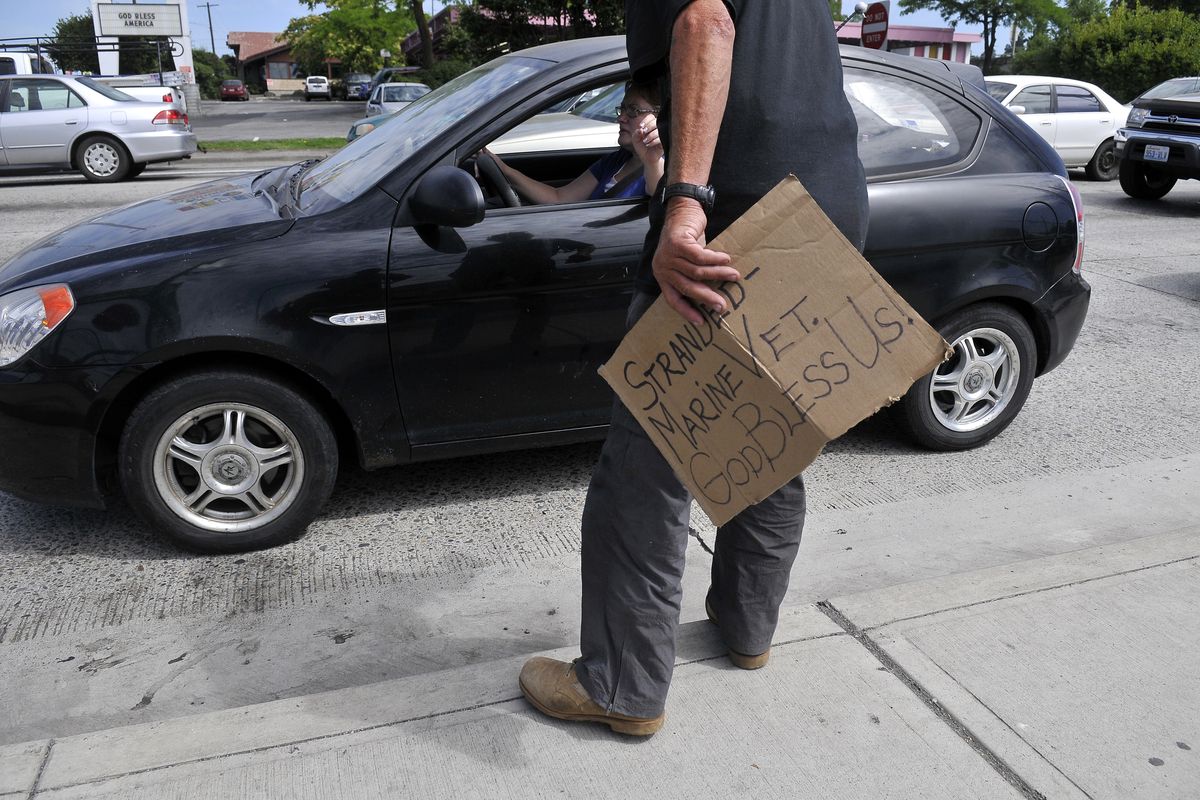Panhandling ordinance would hinder some nonprofits

Richard Henderson stood on the busy corner of Division Street and Third Avenue on Thursday, occasionally reaching into the street to accept a couple bucks from drivers stopped at the intersection.
The 62-year-old veteran, who was shot while serving in Vietnam and suffers from mental health issues, including post-traumatic stress disorder, gets more than $1,000 a month from Veterans Affairs, but admits he spends much of it on beer and panhandles to pad that income.
A proposed ordinance set for Spokane City Council consideration Aug. 20 would make it illegal for him to reach into the street when drivers hold money out the window.
While he said he understands why the proposal has been drafted – “I think they’re trying to do their job” – he said it won’t stop him from panhandling. He’d just move down the street, he said.
“They chase me off all the time,” he said of local police. “They’re starting to chase the homeless around, not just for flying signs, for being homeless.”
The proposal, which Councilman Mike Allen hopes will improve public safety, would prohibit panhandlers from entering some roadways to take money. Entering the roadway to solicit would be a misdemeanor.
But it may also put the kibosh on some fundraising activities by established nonprofit organizations, too.
An unintended consequence, Allen said, is that it would ban fundraisers such as the Spokane Guilds’ School & Neuromuscular Center “Kids for Kids” Penny Drive or firefighters’ “Fill the Boot” campaign for muscular dystrophy.
“Our goal was to try to accommodate them at first, but we ran into constitutionality issues and we’re trying to work that out still,” Allen said. “If we can find a way to accommodate them that’s constitutional, we will certainly do so, but we need to address our panhandling issue in town.”
The original proposal included an exception allowing nonprofits to get a permit, but because panhandling is constitutionally protected speech, a permitting process favoring nonprofits would be unconstitutional.
“You can’t say ‘We like the Guilds’ School, but we don’t like panhandlers,’ ” said Rick Eichstaedt, executive director of Spokane’s Center for Justice. “They’re both solicitation. If you’re trying to protect traffic safety, it doesn’t make sense to allow anybody into the street. If you want this to pass constitutional muster, it’s got to apply to everybody or it’s got to apply to nobody.”
The current proposal mirrors Spokane Valley’s, which was passed in 2010, in that it bans all solicitation; there are no exceptions for any special-event permits. Allen will move forward with an outright ban if needed, but he is looking for a constitutional way to allow the nonprofits to do their fundraising.
Meanwhile, Dick Boysen, executive director of the Spokane Guilds’ School & Neuromuscular Center, said he is “gravely alarmed” about the impact the ordinance would have.
“This change would prevent our volunteers from collecting funds at intersections and major arterials,” Boysen said in a written statement. “The consequences of this action would be devastating to our fundraising efforts.”
The foundation brings in an average of $70,000 annually with its penny drive, said Development Director Ken Daniel. Spokane Guilds’ School & Neuromuscular Center serves infants and toddlers with disabilities.
The ordinance would apply to state routes, Interstate 90 on-ramps and off-ramps, principal arterials, and the first 100 feet of a road that intersects a state route or on- or off-ramps to I-90.
Allen started working on the proposal in April. The first reading of the ordinance is set for tonight’s City Council meeting, with a vote scheduled on Aug. 20th.
Spokane already has ordinances to prevent aggressive panhandling and blocking pedestrian or vehicle traffic. The new ordinance would expand on that to prohibit entering roadways and soliciting money from a vehicle occupant.
“Since the Valley has passed the ordinance, the activity in Spokane has definitely increased,” Allen said. “We receive complaints here on a weekly basis about aggressive panhandling.”
The Center for Justice, which supports the proposal in its current form, is helping to find a constitutional way to permit fundraising activities. Eichstaedt said a simple solution would be to map out more specific areas, on a street-by-street basis, where panhandling has presented public-safety issues, and only outlaw panhandling in those areas.
The Spokane Homeless Coalition supports the ordinance, said Stephan Brown, Spokane Valley Partners emergency assistance manager, on behalf of the coalition.
“Some people really have a desperate need for help,” he said. “They’re not trying to criminalize desperation. They’re just trying to look at the safety of everyone concerned.”
Mike Tedesco, president of the Downtown Spokane Partnership, said the business community hasn’t formally ratified support for the proposal but “really has an appetite for increasing the quality of our gateways.”
Tedesco said the areas where panhandlers often operate are the entrances to downtown Spokane.
“The business community downtown is sensitive to the increased amount of panhandling that we’re seeing and the image that creates for what is really a beautiful downtown, where it’s great to do business.”